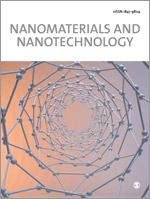
Nanomaterials and Nanotechnology
metrics 2024
Transforming Knowledge into Nanotech Solutions
Introduction
Nanomaterials and Nanotechnology is a premier journal published by HINDAWI LTD, dedicated to advancing knowledge in the rapidly evolving fields of nanomaterials and nanoscale applications. Established as an Open Access platform since 2011, the journal aims to disseminate high-quality research that provides insights into nanotechnology's manifold aspects, including biotechnology, ceramics and composites, as well as electrical and electronic engineering. With a compelling impact factor reflected in its robust Scopus rankings—placing it in the 80th percentile in Engineering and the 72nd percentile in Biotechnology—it stands as a key resource for researchers, professionals, and students seeking to stay at the forefront of innovation in materials science. The journal occupies a distinguished position in the academic community, featuring studies that explore the synthesis, characterization, and application of nanomaterials, thereby contributing significantly to scientific discourse and technological advancement in this critical area.
Metrics 2024
 0.48
0.48 3.10
3.10 3.20
3.20 30
30Metrics History
Rank 2024
Scopus
IF (Web Of Science)
JCI (Web Of Science)
Quartile History
Similar Journals

International Journal of Nanoelectronics and Materials
Unveiling new horizons in nanoelectronics technology.The International Journal of Nanoelectronics and Materials is a pivotal publication in the field of Nanoelectronics and Material Sciences, established by UNIMAP PRESS in Malaysia. With its ISSN 1985-5761 and E-ISSN 2232-1535, this journal has been providing a platform for innovative research and development since its inception in 2012 and is set to continue through 2024. Although categorized in the Q4 quartile for both Electrical and Electronic Engineering and Electronic, Optical and Magnetic Materials as of 2023, it presents an invaluable opportunity for authors to share their findings with a diverse audience while enhancing their academic visibility. The journal is accessible to a varied readership, including researchers, professionals, and students, emphasizing novel methodologies and applications in nanoelectronics technology and material science. It aims to foster scholarly communication and advance knowledge in these critical fields, making it an essential resource for those at the forefront of technological advancements.
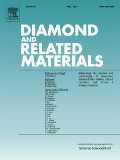
DIAMOND AND RELATED MATERIALS
Illuminating the future of advanced materials.DIAMOND AND RELATED MATERIALS, published by Elsevier Science SA, serves as a premier international platform for the dissemination of high-quality research in the fields of materials science, electrical engineering, and chemistry, with a specialized focus on diamond and its related materials. With an ISSN of 0925-9635 and an E-ISSN of 1879-0062, this journal has established itself within the top quartiles, reflecting its influential contribution to the scientific community, particularly in the categories of Chemistry (miscellaneous) and Electrical Engineering, among others. The journal's wide scope encompasses both theoretical and applied aspects of diamond research, making it an essential resource for professionals and academics alike. The current rankings position it favorably within its respective disciplines, with a notable 79th percentile in General Physics and Astronomy and strong standings in related categories. Although it does not offer open access, researchers can stay informed of cutting-edge advancements and methodologies through its comprehensive articles and reviews, enriching the wider discourse in advanced materials research.
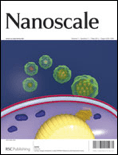
Nanoscale
Transforming Innovations at the Nanoscale.Nanoscale is a premier academic journal published by the Royal Society of Chemistry, dedicated to advancing the field of nanoscience and nanotechnology. With both its ISSN (2040-3364) and E-ISSN (2040-3372) ensuring wide accessibility, the journal is renowned for its high-impact research contributions, reflected in its impressive 2023 Impact Factor and prestigious Q1 ranking in both Materials Science (Miscellaneous) and Nanoscience and Nanotechnology categories. Since its inception in 2009, Nanoscale has fostered a collaborative platform where leading researchers from around the globe share their innovative findings across a multitude of topics spanning from material synthesis to applications in nanotechnology. The journal not only serves as a valuable resource for professionals, researchers, and students but also actively engages the academic community in discussing emerging trends, thus shaping the future of nanoscience. Situated in the heart of the UK at Thomas Graham House, Science Park, Milton Rd, Cambridge CB4 0WF, Nanoscale remains a key publication for those looking to keep abreast of the latest breakthroughs in an ever-evolving field.
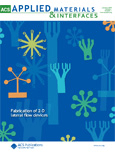
ACS Applied Materials & Interfaces
Exploring Breakthroughs in Materials Science and InterfacesACS Applied Materials & Interfaces, published by the American Chemical Society, stands as a leading journal in the field of applied materials, nanotechnology, and interdisciplinary research in medicine. With an impressive Impact Factor that places it in the Q1 category across Materials Science, Medicine, and Nanoscience and Nanotechnology, this journal consistently ranks among the top tier, evidencing its significance and influence in advancing scientific knowledge. The journal’s scopus ranking of 33 out of 463 in General Materials Science further underscores its critical role in disseminating innovative and high-quality research. Although it is not an open-access journal, a diverse range of access options is available, ensuring that vital research findings are accessible to a broad audience of researchers, professionals, and students. Targeting breakthroughs in the synthesis, characterization, and application of materials and interfaces, ACS Applied Materials & Interfaces serves as a pivotal platform for publishing cutting-edge studies essential for future technological advancements.
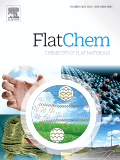
FlatChem
Unveiling Cutting-Edge Research in Materials ChemistryFlatChem, an esteemed journal published by ELSEVIER, serves as a premier platform for disseminating high-quality research in the dynamic fields of ceramic and composite materials, electronic and optical materials, materials chemistry, and surfaces, coatings, and films. Since its inception in 2017, the journal has garnered a robust reputation, evidenced by its rank in the top quartile (Q1) across multiple categories, including a commendable rank of #25/127 in Ceramics and Composites and #49/284 in Electronic, Optical and Magnetic Materials. With a focus on pioneering advancements and innovative methodologies, FlatChem not only highlights cutting-edge research but also promotes collaboration and knowledge exchange within the scientific community. The journal’s impact is underscored by its impressive rankings in Scopus, marking it as a vital resource for researchers, professionals, and students aiming to stay at the forefront of materials science. As an open-access journal, it ensures that groundbreaking findings are readily accessible, fostering a broader understanding and application of materials innovation worldwide. The journal is based in the Netherlands, with its headquarters located at RADARWEG 29, 1043 NX AMSTERDAM, NETHERLANDS. Join the vibrant community contributing to FlatChem and engage with the forefront of material advancements.
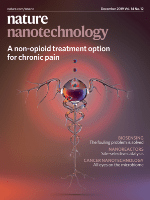
Nature Nanotechnology
Exploring the Boundaries of Nanotechnology Research.Nature Nanotechnology, published by NATURE PORTFOLIO, stands at the forefront of scientific innovation, focusing on the rapidly evolving field of nanoscience and nanotechnology. With an impressive impact factor and ranking in the top Q1 quartiles across multiple disciplines—including Atomic and Molecular Physics, Bioengineering, and Materials Science—this journal is a pivotal resource for researchers and professionals dedicated to advancing knowledge and applications at the nanoscale. Its diverse scope encompasses cutting-edge research that bridges disciplines, addressing critical challenges in engineering, physics, and biomedical fields. Although the journal currently does not offer an open-access option, readers can access a wealth of information that is vital for anyone involved in pioneering research and development efforts. With its robust editorial standards and a commitment to publishing high-caliber, groundbreaking work, Nature Nanotechnology serves as an indispensable platform for the dissemination of transformative ideas that will shape the future of technology and science.

JOURNAL OF ELECTRONIC MATERIALS
Pioneering Discoveries in Electronic, Optical, and Magnetic MaterialsWelcome to the Journal of Electronic Materials, a premier publication in the field of materials science. Published by Springer, this esteemed journal has been a beacon for groundbreaking research in electronic, optical, and magnetic materials since its inception in 1972. As an established resource, it boasts a commendable impact factor and categorically ranks in the second quartile (Q2) in key areas such as Condensed Matter Physics and Electrical and Electronic Engineering, as well as holding a respectable third quartile ranking in fields related to Electronic, Optical, and Magnetic Materials and Materials Chemistry. Researchers, professionals, and students can access a wealth of knowledge as we publish original articles, reviews, and cutting-edge research that push the boundaries of science and technology in these critical fields. Stay informed and engaged as we explore advancements that shape the future of electronic materials.
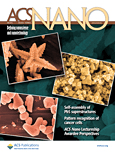
ACS Nano
Driving Discovery in the World of Nanoscale ResearchACS Nano, published by the American Chemical Society, stands as a prestigious journal in the domains of Engineering, Materials Science, Nanoscience, and Physics. With an exceptional impact factor reflecting its standing as a Q1 category journal in multiple disciplines, it plays a pivotal role in disseminating groundbreaking research from 2007 to 2024. Known for its rigorous peer-review process, the journal boasts impressive Scopus rankings—positioned at #1 in General Engineering and #6 in General Physics and Astronomy—placing it among the top 1% of journals in its field. Although it is not an open-access publication, ACS Nano provides a wealth of knowledge that is essential for advancing the development of nanotechnology and its applications across various industries. Researchers, professionals, and students alike will find in its pages a trove of innovative studies and insights that drive the future of materials science and engineering.

Micro & Nano Letters
Connecting ideas in micro and nanoscale research.Micro & Nano Letters is a prominent open-access journal published by WILEY, dedicated to advancing the fields of micro and nanoscale science and technology. Since its inception in 2007, the journal has been a valuable resource for researchers, professionals, and students, delivering high-quality research that supports innovation and collaboration in bioengineering, biomedical engineering, condensed matter physics, materials science, and nanoscience. With an impact factor that reflects its growing influence, Micro & Nano Letters has earned recognition in various Scopus categories, including a Q3 ranking in both Condensed Matter Physics and Materials Science as of 2023. Its commitment to open access, established in 2021, ensures that the latest developments in micro- and nanotechnologies are accessible to a global audience, fostering a multidisciplinary dialogue across academia and industry. The journal continues to play a critical role in disseminating cutting-edge research and promoting technological advancements worldwide.

Nano Materials Science
Exploring the Future of Nanotechnology and Engineering.Nano Materials Science is a premier open-access journal dedicated to the dissemination of groundbreaking research in the fields of nanotechnology, materials science, and chemical engineering. Published by KEAI PUBLISHING LTD, this journal has quickly established itself as a leading platform in its area since its inception in 2019, with impressive rankings in the Scopus database, holding a Q1 position across multiple categories, including Chemical Engineering and Materials Science. Based in Beijing, China, Nano Materials Science provides researchers and practitioners access to a wealth of high-quality peer-reviewed articles, fostering innovation and collaboration within the scientific community. With its impact factor steadily rising and a commitment to open access, the journal aims to bridge the gap between theoretical research and practical applications, making it an essential resource for professionals and students eager to stay at the forefront of materials research and nanotechnology advancements.